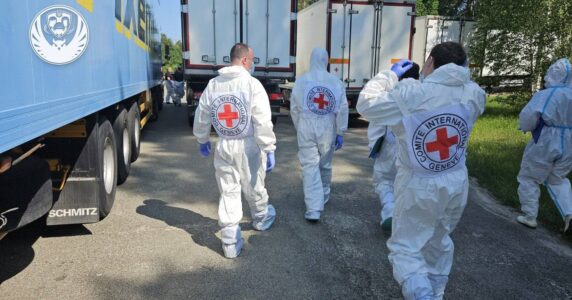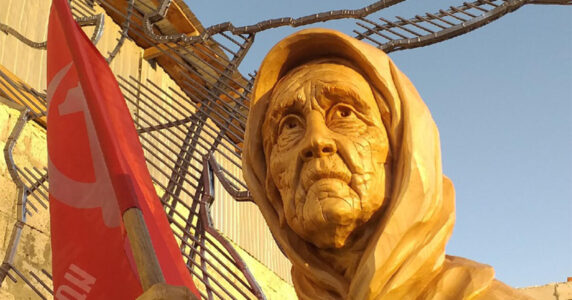Navigation and useful materials
Putin is completing what the deputy head of his administration started, while Shoigu is paving a “friendly African way.” The Centre for Strategic Communication and Information Security has collected the main fakes and narratives of the Russian propaganda of August 16.
- How to create and destroy the myth of the “Crimean fortress”
- Who should train to become “saboteurs” in Russia
- Russians in “Wagnerian” Mali
- Putin is in an arms race with his own people
How to create and destroy the myth of the “Crimean fortress”
In addition with its “sacred” nature and “homecoming,” one of the narratives promoted by Moscow during the occupation of the Ukrainian Crimea went like this: “otherwise, it will host NATO bases which will threaten Russia.”
Propaganda convinced the Russians that Crimea would itself become a major defence for the entire Russia. It embellished this myth with numerous televised footage from various military exercises. Russians were made to believe in the “triumphs” in the “Crimean bastion.”
IN REALITY, the truth was sobering. On August 16, there was an explosion at an ammunition warehouse in the village of Maiske, Dzhankoiskyi rayon, and an electric power substation also caught fire. On the same day, there was an explosion at the air base in Hvardiiske.
This is actually the fourth case already when Russian military objects in the occupied Crimea are damaged due to “personal negligence” or “the elements.”
On July 31, when a UAV exploded in the yard of Black Sea Fleet headquarters, this was perceived as petty sabotage of disorganized local underground. It is still unknown who was behind this attack. The “saboteurs” were never arrested in front of television cameras. Nobody has yet admitted how they were acting “on the instructions of Western supervisors.”
On August 9, a few big explosions happened at an air base in Novofedorivka near Saki, which, among other things, destroyed several military jets. The nature of these explosions has also not been officially named yet. The Russian MoD maintains the version of fire safety violations. They could at least name some scapegoat who was grilling meat next to the explosives. Even if not by the order of Washington, but at least out of negligence, celebrating yet another anniversary of aggression against Georgia.
Moscow tried indeed to talk as little as possible about the cause of this emergency. The very possibility of an incident like that undermines the narrative of the “Crimean fortress,” protected in every possible way. As early as February 24, Aksyonov personally insisted that Crimeans were not in any danger in connection with the start of the “special operation.” But even back then, they started running away from the “fortress,” sensing that something bad was about to happen.
On August 16, however, the Russian MoD quickly announced that munitions were being detonated in Crimea. Obviously, Shoigu’s department learned something from the previous stories. They decided it was best to come up with their own version upfront, rather than awkwardly refute emerging explanations.
But with each passing day, it becomes increasingly difficult for Koshashenkov to explain what is actually happening on the “safe” peninsula. And what is happening was very much expected — another myth of the Russian propaganda is falling apart. This time — the myth about the “Crimean fortress.”
Who should train to become “saboteurs” in Russia
It is likely that an actual witch hunt will begin in Russia now. Especially considering that this August, so intense for Crimea, the official Moscow mentioned “sabotage” for the first time. This means they will start looking for saboteurs. Most likely, they will find them among residents of the occupied Crimea.
IN REALITY, the hunt for “saboteurs” may affect literally everyone: from a retired Crimean Tatar man making a living from selling onions to the commander of the Black Sea Fleet who ineptly sank the flagship.
READ ALSO: If you want to terrorize Crimea, call this a “fight against terrorism”: Russia’s old new narratives
Putin wouldn’t be NeoStalin if he just engaged in persecution of Crimean Tatars. In Russia, about 30–40% of generals and officers have already been removed from their posts and are under investigation. This was reported by deputy head of the General Staff of the AFU, Oleksii Hromov. According to him, the reason for their detention is the failure of strategic plans in the war with Ukraine.
What is the failure, though, if they weren’t warned that in Ukraine, they would face a “hi-tech rival with sufficient weaponry”? The propagandists themselves recognize this.
The only thing that remains to be done is to find who is guilty of the failure to protect Crimea from the AFU.
But Russian propagandists haven’t reached that point yet. But it seems like soon, they will. Apart from writing their regular “victorious” lies in media, they have been recently asking Shoigu more and more uncomfortable questions about the “failure of the strategic plan” in Ukraine.
So, “military correspondents” will soon also become “undesirable” in Russia. And this is one step closer to a “civil” information war. And we cheer for all its participants at the same time.
Russians in “Wagnerian” Mali
At the opening of the Moscow Conference on International Security, whatever that means, Shoigu called the beginning of the Russian “special operation” in Ukraine “the end of the monopolar world.”
He believes friendly countries are also working towards this: Burundi, Guinea, Cameroon, Mali, Sudan, Uganda, Chad, Ethiopia, South Africa.
IN REALITY, nothing else really needs to be said. The monopolar world clearly cannot fight a coalition of this scope. Maybe only with the “pathetic” anti-Russian visa ban.
Here is its brief history.
– Lithuania does not admit anyone except family members of EU citizens or persons equivalent to them.
– Estonia closes borders for Russians who previously received Schengen visas of this country.
– The Czech Republic extended the ban on obtaining visas and residence permits for citizens of Russia and Belarus until April 2023. An exception will be made for trips with a humanitarian purpose and for visiting family members who are EU citizens.
– Finland does not plan to close the border to Russians, but has found a way to reduce their number. One working day, Monday, will be available to file documents to obtain a visa, and the number of visas for Russians will be reduced tenfold.
– Belgium only issues student visas, researcher visas and one-time work visas.
– Malta is open only to Russians who are family members of EU citizens.
– The Netherlands stopped issuing short-term visas to Russians back in April. However, they can be allowed to enter the country for “humanitarian reasons.”
– Slovakia issues visas only in cases of extreme necessity, as well as for certain types of work.
– Poland is developing a concept to deny residents of the Russian Federation visas altogether.
– Bulgaria continues issuing tourist visas to Russians and visas for real estate owners, but the terms of obtaining them have increased due to “technical reasons.” The country is not part of the Schengen area.
– Norway. There is no official ban, but the deadline for considering documents has been extended to 45 days.
Considering this, Russians will soon only be able to visit Mali. And their vacation or shopping will perhaps be supervised by Wagner troops themselves.
Putin is in an arms race with his own people
But instead of wondering why the whole world is showing them the door, Putin and Shoigu decided to continue competing in the arms race. And while during the USSR, the arms race was against NATO, which eventually led to the end of the Soviet Union, now they are in a race with the Russian people.
The contracts concluded by the Russia MoD at the “Army-2022” forum amounted to 500 billion roubles. Deputy Minister of Defence of Russia Krivoruchko reported this on August 16. For this amount (equal to 20 annual budgets of the Republic of Kalmykia), Shoigu plans to purchase and modernize 4,000 units of military and special equipment.
As of August 16, according to the report of the General Staff of the Armed Forces of Ukraine, Russia has already lost a total of 11,985 units of military equipment in Ukraine: from fuel tanks and oil to the missile cruiser “Moskva.” Who knows what awaits republics like Kalmykia in the future, considering this situation.
IN REALITY, this news is especially interesting considering that 24 years ago, on August 17, 1998, Russia declared a technical default. Moscow refused to maintain the exchange rate of the rouble against the US dollar, which until then was artificially supported by the Central Bank of the Russian Federation.
And on June 27, 2022, Russia defaulted on its sovereign debt in foreign currency.
These two events have one character in common — Sergey Kiriyenko, who was Russia’s PM in 1998. Earlier that same year, he introduced a certain Putin, appointed as the new director of the FSB. And after the default, Kiriyenko was removed from his post. Now he is the deputy head of the presidential administration and the “unofficial supervisor of the Donbas.”
Could the situation from 1998 happen again in Russia? It could.
Russia has all characteristics of a default country. Three leading international agencies have sunk its rating: Fitch, Moody’s and S&P.
Sanctions apply to the National Settlement Depository of Russia, through which settlements of its state and corporate securities are processed. American bans on payments on Russian government bonds are in effect.
Sectoral sanctions are in effect. All the world’s leading companies have left Russia. Losses from the flight of foreign investors after the start of the full-scale war constitute about 2 million jobs. About the same number of jobs were lost at related enterprises.
Russia’s default is caused precisely by Putin’s model of its development: “we sell oil and gas, we buy the rest.” Since Europe is gradually giving up both, Russia’s main budget-forming state corporations, Gazprom and Rosneft, are on the way to their own defaults.
Russia’s financial system is artificially supported by the Central Bank in various ways.
Back then, in August 1998, Russia’s 67-year-old president Yeltsin said that there would be no default, and that it was not fantasy, but forecast based on meticulous daily work. And two days before the default, Kiriyenko explained that “what is happening in Russia is rather from the field of psychology than finance.”
24 years have passed since. Of course, Russia doesn’t have the same problems as it did back then (Kiriyenko’s government was missing $5 billion, a ludicrous amount by current standards). But it has much more serious problems instead — USD and EUR have been announced “toxic currencies.”
What is happening in Russia today is also largely based on psychology — of one person, who is currently two years older than Yeltsin was at that point. Putin has actually already brought Russia into default. All the signs are there. Russians are still ignoring them — but the reality is already knocking on their doors.
If you have found a spelling error, please, notify us by selecting that text and pressing Ctrl+Enter.


